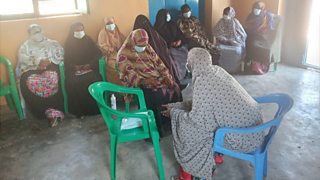How Somali women are supporting the countryβs economy β and its future
Mohammed A. Gaas
Deputy Country Director, Somalia
Tagged with:
In Somalia, traditional gender roles and cultural norms run deep, and women running small businesses have often done so out of circumstance: widowhood, divorce, or a family that is otherwise struggling amid high rates of unemployment. In these situations, women frequently support their households by selling market goods such as tea, charcoal, vegetables, milk or khat leaves.
But these cultural norms are changing, as a growing number of young Somali women returning home from abroad go into business to attain financial freedom and to maintain control over their own lives.
This is a clear indication that with time, entrepreneurship by women will play a key role in the growth and economic transformation of Somalia. Tax collected from these small businesses can play a vital role in the country’s economy. And this shift in gender roles in business can, in turn, lead to further transformation of the role of women in society.
Training for the future
I am proud to be leading a project that is training 400 women in entrepreneurial skills for formal and informal business, including some of the most vulnerable groups in our society, and to encourage men to back them in their endeavours.

Somali women meet in an entrepreneurial training session. Photo credit: ΒιΆΉΤΌΕΔ Media Action
Our aim is to enable women in Somalia to overcome the barriers they face in accessing the labour market, and so tackle the hardships that result from poverty, conflict and a clan-based culture which promotes strict male hierarchy and authority. Religious and cultural limitations also impact women’s role and societal status.
Our project, Somali Women's Economic Empowerment and Transformation (SWEET), helps enhance business skills, builds networks, and overcomes cultural myths and norms around the status of women in the community, in part by including religious leaders in our discussions. We also provide Somali people with public platforms to discuss issues surrounding women entrepreneurship, including success stories from role models, and the cultural norms that hinder women’s success in the business world, through our Facebook and Twitter pages and our work with five local radio stations, producing localised programmes in their regions.
Celebrating real-life successes
This local work is accompanied by a national radio drama featuring real-life success stories of women in business, and how they overcame negative myths and cultural norms; it also invites audiences to interact by discussing ‘dilemma’ questions.
For instance, Fardaus, who is 24 and the proud owner of a boutique in Hargeisa, told me that her aunt helped her to convince her father to agree to her business, and support her financially to realise her dream.
"The more my business grew, the more I became independent," she told me, smiling. "I have also inspired many young women in setting up small businesses.’’ Faurdaus is a university graduate with a degree in computer science; she now hopes to build on her success with a chain of boutiques in cities across Somaliland.
Despite all the challenges women entrepreneurs encounter in Somalia, they are showing that they are up to the challenge of being skilled business operators, often while also balancing their more traditional roles.
By encouraging dialogue among men and women, providing information on business opportunities, training in financial management and ‘soft skills’ like customer relations, and providing access to business networks and financial services, we believe these women are empowered for a better future for themselves and for their community and society.
SWEET is supported by the Norwegian Agency for Development Cooperation (NORAD) - learn more about the project here.
